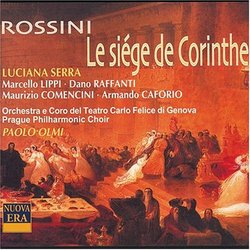In original french libretto, but still an italian opera.
Reynaldo Pulido | Caracas, Venezuela | 02/02/2006
(4 out of 5 stars)
"It's glad to have a opera who suffered sad distorsions in its original version, caring the details the composer would have thought when he created a workpiece.
When you listen the Barbiere of Molajoli and then, you listen the Abbado recording you can see how the musicologic studies have improved. But specially, with the Rossini's french opera, i appreciate when the producer decides to do it in its original version, because can show the changes that Rossini create in its original version.
The cases of this revision are Maometto II, Mosè in Egitto and Il Viaggio a Reims, which became in La Siège de Corinthe, Moïse et Pharaön, and Le Comte Ory (the only exception was Guillaume Tell, which did not derive from any previous opera). For my opinion, the happiest revision of them was precisely the "Mamometto-to-Siege" one, not only because Maometto has been a excellent source, but the revision did not lose the initial quality of the opera.
In Siège the opera lose the architectonic greatness of Maometto, which have huge numbers, like the "Terzettone". Rossini gives more orchestral colour to the score, more ballet music, and a more sensitive theme (The Greece's independency), producing a more dramatic work piece, closer to the french taste, without the exageration of a Fernando Cortez, Les Huguenots, etc (I'm not going to say Guillaume Tell). And like the french version of Gluck's Orpheus and Euridice, the mezzo part of the lover became in a more credible tenor part, being this opera one of the difficulty scores in history that requires two "primos", like Otello, Armida, Elisabetta, Viaggio a Reims, etc.
First, the Siege have a vivid overture, which has a initial melody "auto-borrowed" from Bianca e Falliero, and after Richard Osborne, and a melody from Haydn(a rare practice in Rossini). Later, the introduzione, the compacted trio, the chorus cavatina of Mahomet, which only keeps the recitative and the cabaletta from the original, and the finale, which is the same of Maometto. Then the second act includes the same duetto between Pamyra-Mahomet (Ana-Maometto), the ballets -where you can listen the second theme and crescendo of a Viaggio a Reims' overture not performed neither in the prima nor currently. Later a new music that closes the second act with the crescendo of the overture. The third act has the long Neoclès aria which is for tenor, and it's not the aria of Calbo in Maometto II for mezzo, very well sung by Verrett and Horne in previos sieges in the too corrupted version of Schippers to bird-like Beverly Sills; the legendary prayer of Pamyra (placed in the Terzettone in Maometto II, with less dramatic effects) Juste Ciel, and the hurry finale.
And now, going to the matter, the treatment of this score in this recording is good, with the special mood of a live recording, but limited by the continous music that impedes applauses at the end of a furious aria or trio.
But I regret the singers do not show the french sounds like native, but too italian that it is preferable to listen them singing L'Assedio a Corinto. And only you have to read the cast Lippi, Serra, Comencini, Raffanti...Well, later of buy the Schippers version with the histeric coloratura of Sills, like Peters, Pons or Capsir, I forgive this and forgive the little cuts in the strette and the cabalette. I recommend this recording, not only for the artistical quality (Serra -being the heavy argument to buy this CD-with a exceptional obscure voice, complies with all the requirements for this typical rossinian soprano, who only goes high if the singer wants it, so mezzo can sing Juste Ciel as well as a soprano, for instance, Bartoli, Horne, Berganza and Larmore), but its price and the analytic brochure, with a only-french libretto."


 Track Listings (10) - Disc #1
Track Listings (10) - Disc #1